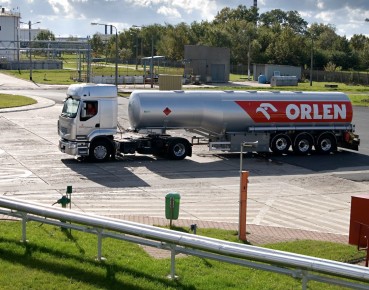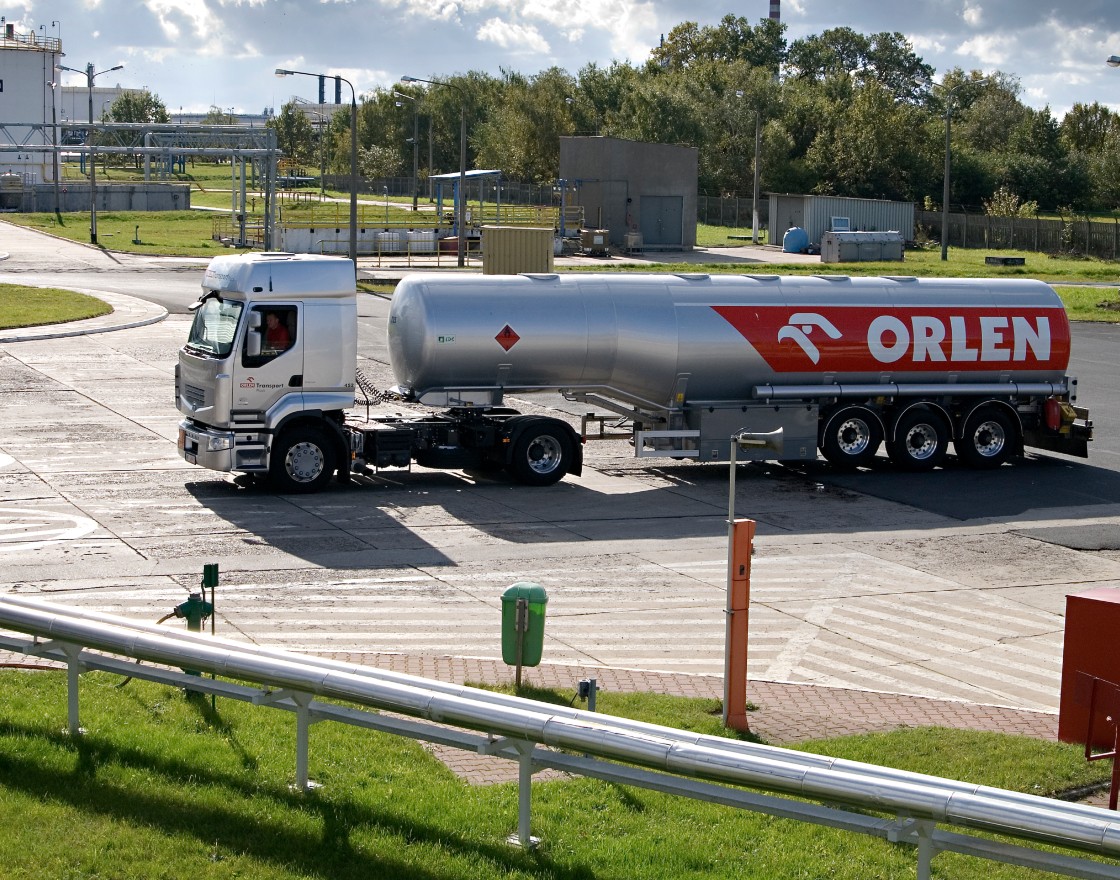Tydzień w gospodarce
Category: Trendy gospodarcze

(PKN Orlen, Public domain)
PKN Orlen has already bulked up, receiving conditional EU antitrust approval to take over smaller rival Lotos (also an oil company), and acquiring the energy utility Energa. The state owns 27.52 per cent of PKN and 71.88 per cent of PGNiG. Their combined market value is over the EUR11.7bn. PGNiG employs more people than Orlen and is worth the EUR2.2bn more on the stock exchange than Orlen. The combined revenues of the merged companies would give Orlen a position similar to Italian Enel. The merger of all entities: PKN Orlen, Energa, Lotos and PGNiG would create a company with an annual turnover of the EUR45bn. For comparison, last year’s revenues of the largest European oil company — British-Dutch Royal Dutch Shell — amounted to the GBP345bn, and net profits to the GBP16bn. Second in Europe, British BP had the GPB278bn in turnover and the GBP4bn in profit. The third, French Total had revenues of the EUR176bn and profits of the EUR11.3bn. Italian Enel had the EUR77bn in revenues and the EUR2.2bn in profit. The largest US oil company, Exxon Mobil, had revenues of the USD256bn last year, and the USD14bn profit, and the second Chevron — the USD140bn turnover and almost the USD3bn profit.
The approval of the Lotos takeover by the EU competition chief Margrethe Vestager is a sign that EU industrial policy is rapidly taking a far more political direction. The current EU state aid rules are meant to prevent national governments helping favored domestic firms with tax breaks or subsidies. But after EU antitrust authorities’ decision to block several large mergers in 2019, most notably between train makers Alstom from France and Germany’s Siemens — a move which prompted Germany and France to call for a reform of the EU competition policy — there has been a debate within Europe about how competition policies could be improved.
At the time when the European Commission (EC) announced it would block the Siemens-Alstom merger, Ms. Vestager said she was acting to protect competition in the European railway industry. She also dismissed the two company’s argument of „merging to compete” with their bigger Chinese state-owned rival CRRC on the European market.
After the decision, an EC spokeswoman told Reuters that EU policy had „not impeded the creation of European champions,” noting how the EC has cleared numerous large mergers that created European champions or allowed them to grow. She named the takeover of German carmaker Opel by France’s Peugeot and InBev’s acquisition of SABMiller in the beverage industry. According to figures provided by the EU’s Directorate-General for Competition, regulators in Brussels have blocked only nine out of over 3,000 merger cases scrutinized over the past 10 years.
France’s finance minister, Bruno Le Maire, and German Economy Minister Peter Altmaier have already signed a joint manifesto calling for a reform of the EU’s competition rule book, including relaxing merger regulations and giving the European Council the power to override vetoes by the EC. But the Franco-German momentum for the reform is not as strong as it may seem, with half-hearted enthusiasm in Germany. German Chancellor Angela Merkel has publicly expressed her support for Le Maire’s proposal, saying reform is necessary to counter China’s rising economic power. But her Christian Democratic Union (CDU) is split on the issue.
In Brussels, however, the conservative EPP alliance, of which Merkel’s CDU is a key member, appears to be driving a more ambitious EU industrial policy, which includes creating the behemoths needed to stay in the global race.
“It is interesting because much of these domestic forces go against, for example, movement to greater global gas market liberalization, i.e. higher number of participants, higher level of market-driven contracting, spot-purchasing and gas-on-gas pricing. Those terms have been definitely influenced by higher involvement of US gas providers (private companies) on the global market. But participation of private US firms did not have similar influence on the way other global market participants function. While they are happy to participate in much deeper, diversified and liquid market, they are often very wary of introducing liberalization domestically or divorcing energy from state influence. Much of this relates to their initial setup, need for investment and often is a response to energy security dilemma,” says energy sector specialist, Anna Mikulska.
The Orlen and PGNiGmerger is in line with the Polish energy objectives, according to Maciej Jakubik of Central Europe Energy Partners (CEEP), an organization that represents the interests of energy and energy-intensive companies from Central Europe.
Poland has long been keen to end its reliance on Russian gas, and Warsaw has repeatedly claimed it will not buy any gas from Russia after 2022, when its current contract with Gazprom, known as the Yamal Agreement, ends. Instead, the country plans to get its gas from Norway and in the form of liquefied natural gas (LNG) shipped by sea mainly from the US.
The Baltic Pipe is an important component of the current Polish energy sector strategy, a component that PKN Orlen and PGNiG will no doubt benefit from once merged. This pipeline will carry natural gas from the Norwegian section of the North Sea through Denmark to Poland.
“Bigger companies have more possibilities to carry out bigger and capital-intensive projects, such as building offshore wind farms or big gas-fired power plants. In this context, it will help to change the Polish energy mix towards low carbon,” says Mr. Jakubik. “A new entity will be able to gather more significant funds for offshore, photovoltaics and low emission investment. Merged, PKN Orlen-Lotos-Energa-PGNiG, will be a new, „green” company,” he explains.
At the same time, energy sector analysts expect the market in emerging Europe to become more integrated and more competitive. With plans such as the Baltic Pipe and Bulgaria’s Balkan Gas Hub, energy companies in the region will face both challenges and opportunities. “Orlen will become the biggest energy company in the region and thus will have the possibility for further expansion. We can expect some acquisitions in neighboring markets, probably in the downstream sector,” Mr. Jakubik adds.
The process of becoming independent from Russian gas is manifested in the expansion of the LNG terminal in Świnoujście (8.3 billion cubic meters annually reserved by PGNiG), the construction of the Baltic Pipe (10 billion cubic meters annually with a reservation of 8.3 billion by PGNiG) and bringing the floating FSRU terminal to the Gulf of Gdańsk (5-9 billion cubic meters annually, probably also at the disposal of PGNiG).
The role of PGNiG in the diversification process is inalienable. It was PGNiG that guaranteed the profitability of the LNG terminal in Świnoujście, first with the Qatari contract, then by reserving more capacities for new contracts with Americans.
Arguments in favor of the PGNiG-Orlen merger that the larger company will compete more effectively in the international arena can also be used to defend PGNiG’s privileged position on the market. A strong PGNiG will be more effective in conquering foreign markets, for example as part of the Three Seas initiative supported by the USA.
“The EC sees that in a growing global competition, especially between the US and China, European companies are too small,” says Aleksander Szpor from Polish Economic Institute. “Additionally, the coronavirus revealed the dangerous level of dependency on supplies from Asia, mostly China. Should the Orlen convince the EC that its expansion will not threaten the internal market and will help to increase European independence, the Commission may give a go to the consolidation.”
“The Polish government’s involvement in energy market is nothing new and nothing that differ substantially from other European countries. It is important to note that European Green Deal and actions related to it are not market but policy driven. In that sense, countries and the EU as their organization sets priorities and influences market conditions etc. One can only note the recent issues related to French government involvement in Engie’s deal with US’ NextDecade LNG off-take agreement citing methane emissions as reason for the push against US shale. French government owns 24 per cent of Engie’s shares,” Ms. Mikulska says.


